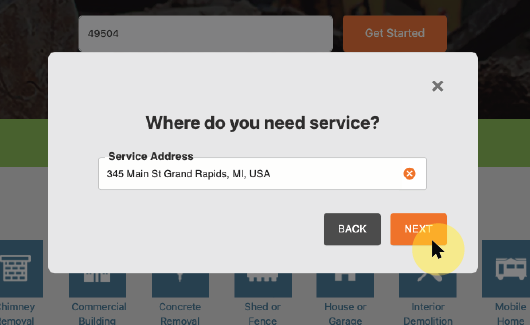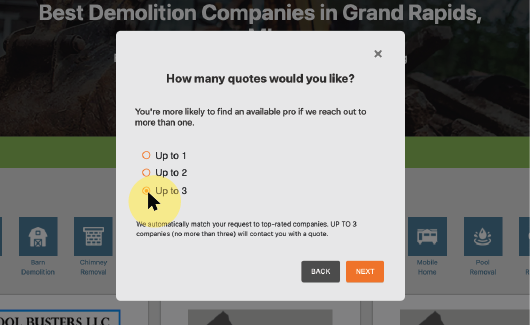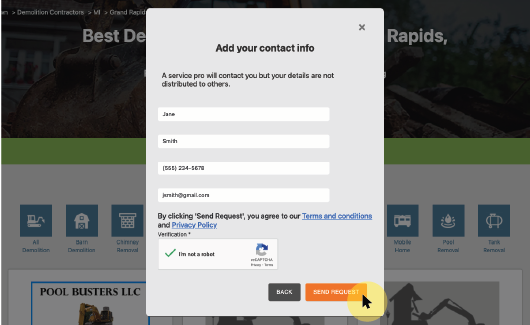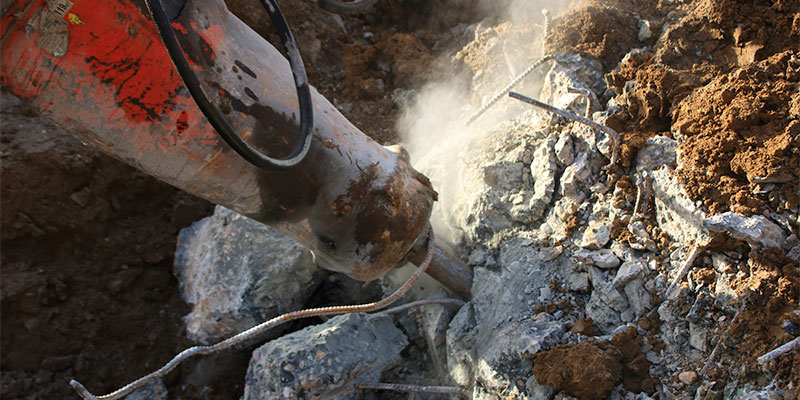
Updated February 6, 2024
As a homeowner, your home is often your biggest investment and greatest asset. Naturally, you want to do everything you can to keep it in great shape without overspending in the process.
Throughout homeownership, there are countless projects that will need to be done to keep your home in good condition. In some cases, you'll be able to handle the work yourself, but in others, you'll need to hire a professional to handle it properly and safely for you.
We've all heard horror stories about someone who hired a contractor only to be left with shoddy or unfinished work, overpriced services, or, in worst case scenarios, they leave the home even worse than they found it.
We've created this guide to hiring a contractor to make it easier for homeowners to know the steps to finding the best contractor, the signs of a bad contractor to look out for, how to utilize resources to educate yourself on your specific project and find a great local contractor without wasting your valuable time.
One of our main recommendations is to take your time when choosing your contractor, and this guide is the perfect place to start.
Table of Contents:
- What Makes a Contractor Qualified
- How to Find the Best Contractor
- How to Compare Contractor Quotes Accurately
- How to Avoid Contractor Scams
- Questions to Ask a Contractor Before Hiring
Tackling a demolition or home remodel project? Find a demolition contractor with Hometown.
What Makes a Contractor Qualified
Hiring a qualified contractor is the most important thing, but what makes a contractor qualified?
Of course, different projects or service types have different qualification requirements, but in most cases, a contractor should possess the following:
- A license to perform the work they offer
- Liability and worker's compensation insurance
- Multiple years of experience performing the work they offer
- Positive reviews from past customers
Following up on these qualifications is important, so never hesitate to ask for proof of license or insurance, or references of past work.
How to Find the Best Contractor

Breaking it down into steps, you can see that finding the right contractor for your project, whether it be a remodel, demolition project, or construction, is not so complicated, especially when utilizing Hometown's convenient resources.
Step 1: Find Local Contractors That Perform the Service You Need
The first step to finding the right contractor is researching local companies near you.
Browsing demolition contractors that serve your area is simple with Hometown. Click "Find Pros" at the top of the page and select your project category. From there, you can scroll down to select your state and city to view a complete list of companies in your area.
The more contractors you can find, the better your chances are of finding the perfect person for the job.
Step 2: Verify Qualifications and Read Reviews
Two of the most important qualifications of any contractor, but especially a contractor performing remodeling or demolition work, is being licensed and insured. In most states, contractors need a license to perform demolition or remodeling projects.
Determine your state's contractor licensing requirements to be sure you're hiring a contractor with the basic qualifications. If your state requires a license, be sure you hire a contractor with the proper licensing. A licensed contractor should always list their license number on their quotes, contracts, or website, and if they aren't willing to provide you with their license number, consider it a red flag and a sign to hire a different contractor. You should never be afraid to ask a contractor for their license number, and confirm the contractor you hire is insured and bonded, too.
Seeing what other customers have to say about contractors' services can also be extremely helpful in the hiring process. Hometown collects and publishes reviews from verified customers, so you can trust that the reviews you read on our site are real.
Step 3: Request Written Quotes from Multiple Contractors
Another smart and simple way to keep yourself protected from surprises when dealing with contractors is to require a written contract from any contractor(s) you hire. Getting all project details in writing ensures you know exactly what to expect and you're not caught by surprise when it comes to payments, work done, etc.
In general, a contractor's written quote/contract should outline…
- The specific work that will be done
- The material and equipment that will be used to accomplish it
- A payment schedule for the work
- Estimated schedule or work timetable
Before signing any contract, be sure you understand exactly what it entails. Don’t hesitate to ask for clarification from your contractor.
Hometown's expertise is in helping customers find local demolition contractors. Browse qualified contractors that serve your zip code, learn more about their company, read customer reviews, and easily request multiple quotes to compare them.
When using Hometown to request a quote, we make it easy to send a single quote to multiple contractors with the click of a button. Simply answer a few quick questions, and we'll send your request to up to three local contractors for you.
Here's how Hometown's demolition contractor quote request form works...

1) Click "Find Pros."

2) Select the service you need.

3) Enter your zip code to get started.

4) Browse local companies below, or continue filling out our quote request form to save time.

5) Our quote request form will ask you a few basic questions about your project.

6) Select the type of demolition you need.

7) Enter the address where you need this service.

8) Describe your project.

9) Select the number of quotes you'd like to receive.

10) Enter your contact information, then send your request.
Once you've submitted your request, the contractor(s) will then receive a limited view of said quote request and will have the option to either accept or decline it.
If the contractor accepts it, they'll reach out to you soon to discuss your project and provide you with a quote. We recommend waiting to sign anything until after you've been able to read and compare at least three quotes in order to ensure you get a fair price and great services.
Step 4: Compare Quotes and Choose the Right Contractor
Not all contractors prepare their quotes the same way. Because of this, it’s important to understand what information to look for so you can make an informed decision on who to hire.
Qualified, legitimate contractors are transparent and upfront about what they charge for labor—whether it’s hourly, daily, or by project—materials, and permits. If a contractor's quote is vague and lacking detail, ask them to provide a by-line item quote. If they are unwilling to do so, this is a red flag.
Below, we break down how to compare different contractor quotes so you have a thorough understanding of what each entails and you can make the best selection.
Starting a demolition project? Find a local demolition contractor with Hometown.
How to Compare Contractor Quotes Accurately

Because not all contractors prepare their quotes and price their services the same, it's important you understand exactly what is included in each estimate so you can accurately compare each contractor's quote.
When looking at each quote, ask yourself the following questions...
Price
- How much do they estimate the project will cost?
- Do they charge an hourly or daily rate? Or a flat fee per project?
- How much time do they think the project will take?
- What is the cost of materials and what are the materials?
Payment Terms and Schedules
- What are their accepted forms of payment?
- What is the expected payment schedule?
- Do they expect any money upfront?
Qualifications and Experience
- Are they licensed? What's their license number?
- What kind of insurance do they have?
- Are they bonded?
- How much experience do they have performing this type of work? Can they provide references or example photos?
Once you have the answers to these questions for each contractor's quote, you'll be able to properly compare and contrast them. From there, you'll be sure you're hiring the best contractor with the best service for the best price.
How to Avoid Contractor Scams
Following the above steps is a great way to ensure you hire a qualified local contractor for your project. However, when looking for contractors, it's also important to be aware of the potential "red flags" of a bad contractor so you can avoid hiring them.
A qualified contractor who has the appropriate licensing and insurance will not exhibit these red flags, but those who do likely are unqualified, unlicensed, uninsured, or a combination of the three.
To avoid being scammed by a contractor, do not hire someone that exhibits any of the following behavior:
-
They are not licensed or insured.
If your contractor doesn't have the appropriate license or insurance, you could be the one left responsible should something go wrong or someone gets hurt during the project. -
They ask you to pay more than 50% of the total project cost up front.
If your project costs a few thousand dollars or more, paying the total project cost upfront puts you at risk; a qualified contractor operating legally wouldn't ask you to do this. If your project is complex and costs more than a few thousand dollars, it's more reasonable to pay 30% or less upfront, and then pay as the work is completed. -
Their price seems too good to be true.
If a contractor is pricing their services much lower than other local competition, it's likely for a reason, and not a good reason. They could be unqualified or unlicensed and hoping that their low price compensates for that and you'll hire them anyway. -
They are unwilling to provide a written quote or contract.
A written quote or contract acts as a written agreement to the work being done, how much the work will cost, accepted forms of payment, payment schedule, and other important details. Having this contract protects you in case something goes wrong. Without a written contract, it would be your word against theirs should they end up demanding more money or claiming they finished the job when they didn't finish what you initially agreed on.
Learn more: Never Say THIS to Your Contractor
Questions to Ask a Contractor Before Hiring
Your specific project will likely affect the exact questions you should ask contractors you speak to when deciding who to hire; however, here is a general idea of the questions you should ask before hiring a contractor.
- Do you have a license for this work? What is your license number?
- Do you have insurance? May I see your certificate of insurance?
- Will you acquire all the necessary permits and schedule the inspections for this project?
- How long have you been performing this type of work?
- How much will the project cost?
- What is the payment schedule?
- If there are any additional charges, how will they be handled?
- What are the estimated start and completion date(s) for the project?
- What are your hours for work days?
- Who will be working on my home each day?
- What is the best way to contact you?
- Will the site be cleaned up at the end of the day?
Some of these questions are obsolete for smaller projects, but larger projects require a more in-depth research process. Be sure to ask any questions you have; that way you will have a very thorough and clear understanding of who you're hiring.
Once you're 100% satisfied with a contractor's responses, you know you've found someone worth hiring.


